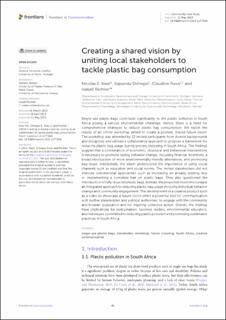| dc.contributor.author | Neef, Nicolas E. | |
| dc.contributor.author | Shihepo, Kapandu | |
| dc.contributor.author | Roos, Claudine | |
| dc.contributor.author | Richter, Isabel | |
| dc.date.accessioned | 2023-10-02T09:15:23Z | |
| dc.date.available | 2023-10-02T09:15:23Z | |
| dc.date.created | 2023-06-16T12:34:00Z | |
| dc.date.issued | 2023 | |
| dc.identifier.citation | Frontiers in Communication. 2023, 8 . | en_US |
| dc.identifier.issn | 2297-900X | |
| dc.identifier.uri | https://hdl.handle.net/11250/3093406 | |
| dc.description.abstract | Single-use plastic bags contribute significantly to the plastic pollution in South Africa posing a serious environmental challenge. Hence, there is a need for comprehensive strategies to reduce plastic bag consumption. We report the results of an online workshop aimed to create a positive, shared future vision. The workshop was attended by 12 invited participants from diverse backgrounds and disciplines and utilized a collaborative approach to propose a framework for reducing plastic bag usage during grocery shopping in South Africa. The findings suggest that a combination of economic, structural and behavioral interventions is necessary to promote lasting behavior change, including financial incentives, a broad introduction of more environmentally friendly alternatives, and promoting bag reuse. Additionally, the vision underscored the importance of using social channels such as education and social norms. The invited stakeholders did not endorse conventional approaches such as increasing an already existing levy or implementing a complete ban on plastic bags. They also questioned the introduction of fully recycled plastic bags. Instead, the proposed vision encourages an integrated approach to reducing plastic bag usage involving individual behavior change and community engagement. The development of a creative product such as a video to showcase a future vision offers a powerful tool for communication with further stakeholders and political authorities, to engage with the community and broader population and for inspiring collective action. Overall, the findings have implications for policymakers, business leaders, environmental educators, and individuals committed to reducing plastic pollution and promoting sustainable practices in South Africa. | en_US |
| dc.language.iso | eng | en_US |
| dc.publisher | Frontiers Media S. A. | en_US |
| dc.rights | Navngivelse 4.0 Internasjonal | * |
| dc.rights.uri | http://creativecommons.org/licenses/by/4.0/deed.no | * |
| dc.title | Creating a shared vision by uniting local stakeholders to tackle plastic bag consumption | en_US |
| dc.title.alternative | Creating a shared vision by uniting local stakeholders to tackle plastic bag consumption | en_US |
| dc.type | Peer reviewed | en_US |
| dc.type | Journal article | en_US |
| dc.description.version | publishedVersion | en_US |
| dc.source.volume | 8 | en_US |
| dc.source.journal | Frontiers in Communication | en_US |
| dc.identifier.doi | 10.3389/fcomm.2023.1177334 | |
| dc.identifier.cristin | 2155258 | |
| cristin.ispublished | true | |
| cristin.fulltext | original | |
| cristin.qualitycode | 1 | |

